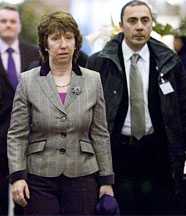By Associated Press ,
GENEVA (AP) — Iran and six world powers concluded talks Tuesday with an agreement to reconvene early next year, suggesting Tehran may be willing to address concerns about its nuclear program. But Iranian President Mahmoud Ahmadinejad warned that unless they lift U.N. sanctions the six face failure in the next round.
Diplomats from delegations at the table with Iran said Tehran made no commitments to talking about U.N. Security Council demands that Tehran freeze uranium enrichment — which has both civilian and military uses.
“We didn’t get anywhere on substance,” said one of the officials. “It was an exchange of views.”
Iran’s chief negotiator, Saed Jalili also sought to dampen expectations.
“I am telling you clearly and openly that halting uranium enrichment will not be discussed at the Istanbul meeting,” he told reporters.
But the diplomats said Jalili did not object when the six powers, the United States, Russia, China, Britain, France and Germany, brought up concern over enrichment during two days of talks that ended at midday Tuesday. The fact that the Iranians listened to international worries led to the decision to agree to a second round, said the three officials, who asked for anonymity because the information was confidential.
Ahmadinejad set the bar high for the success of those next talks, saying it hinged on whether the U.N. Security Council agreed to lift five resolutions and four sets of sanctions against his country, imposed over its refusal to freeze enrichment. That is something the five permanent Security Council members are unlikely to even consider.
“If you come to talks with sincerity, loyalty to the law, friendship and respect … and cancel resolutions, sanctions and some restrictions that you imposed, it will definitely be helpful,” state TV’s website quoted Ahmadinejad as saying.
“But if you again come with deception and animosity, not respecting the rights of the Iranian nation … the response of the Iranian nation will be the same as you’ve received until today. This response will be very regretful.”
He also scoffed at the suggestion that United States with its huge nuclear arsenal and its allies were afraid that Iran could develop nuclear arms, saying “this claim is a lie and deception,” in comments quoted by state TV.
In Geneva, the European’s Union’s foreign policy chief, Catherine Ashton, said agreement on a new meeting was reached after “substantive talks.”
“We and Iran agree to a continuation of these talks in late January in Istanbul,” said Ashton, speaking on behalf of six.
Ashton had previously rejected Tehran’s preference for a meeting in Istanbul, where Iran would have Turkish allies on the sidelines, and agreement on that venue appeared to be a concession to the Islamic Republic.
She declined to go into details saying only: “We recognize Iran’s rights but insist it fulfills its obligations.” While the six powers accept Iran’s right to develop nuclear power they insist that Tehran meet U.N. Security Council demands.
At the Istanbul meeting “we plan to discuss practical ideas and ways of cooperating toward the resolution of our full concerns about the nuclear issue,” Ashton told reporters shortly after the second day of talks ended around noon.
Jalili confirmed the timing and venue of the planned talks, while serving notice that his country would not deviate from its insistence that it has a right to enrich uranium for peaceful purposes.
“We reject the idea of talks under pressure,” he told reporters.
While avoiding the mention of international concerns over Iran’s nuclear program he said his country was ready to “sit down and talk about common concerns over important international issues, security concerns, economic concerns and so forth.”
International concerns are great because Tehran developed its enrichment program clandestinely and because it refuses to cooperate with an IAEA probe meant to follow up on suspicions that it experimented with components of a nuclear weapons program — something Iran denies.
Officials from the six powers said Jalili declined to address their worries on enrichment and related issues, focusing instead on generalities and perceived mistakes made by the West in its treatment of Iran over the nuclear issue.
Still, “the vast majority of the talks was about the nuclear issue,” said one of the officials, leading to the decision to continue the process on the same topic but focusing on advancing them to specific Security Council concerns.
“Jalili gave sense he understands international concerns,” he said. “It’s clear he’s heard our concerns.”
___
Dareini reported from Tehran. Associated Press (News – Alert) writers John Heilprin and Frank Jordans in Geneva contributed to this report.






